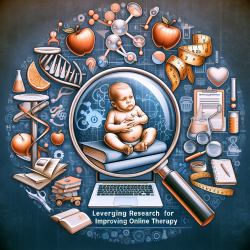Recent research published in the International Journal of Environmental Research and Public Health has provided critical insights into the relationship between being born large for gestational age (LGA) and the risk of academic delays and learning disabilities. The study, titled Large for Gestational Age and Risk for Academic Delays and Learning Disabilities: Assessing Modification by Maternal Obesity and Diabetes, examines how maternal conditions such as obesity and diabetes during pregnancy influence these risks. This blog post aims to help practitioners in online therapy understand and implement the outcomes of this research to better support students facing academic challenges.
Key Findings from the Research
- Children born LGA to mothers with gestational diabetes are at an increased risk of underperforming in mathematics and being referred for special education.
- Conversely, children born LGA to mothers without gestational diabetes showed a slight decrease in the risk of academic underperformance.
- Inadequate prenatal care among women with gestational diabetes is associated with a higher likelihood of giving birth to LGA infants.
Implications for Online Therapy Practitioners
Understanding these findings can help online therapy practitioners tailor their interventions to address the unique needs of students born LGA, particularly those whose mothers had gestational diabetes. Here are some actionable steps:
1. Early Identification and Monitoring
Online therapists should work closely with schools to identify students who were born LGA and whose mothers had gestational diabetes. Early identification allows for timely interventions, which can mitigate the risk of academic delays.
2. Personalized Intervention Plans
Develop personalized intervention plans that consider the child's birth history and maternal conditions. Focus on strengthening mathematical skills and providing additional support in areas where the child is underperforming.
3. Collaboration with Healthcare Providers
Encourage collaboration between schools, healthcare providers, and families to ensure that children receive comprehensive care. This can include regular monitoring of the child's academic progress and any ongoing health issues related to being born LGA.
4. Parental Education
Educate parents about the importance of prenatal care and managing conditions like gestational diabetes during pregnancy. Providing resources and support can help expectant mothers reduce the risk of their children being born LGA.
Encouraging Further Research
The study highlights the need for further research to explore long-term academic and neurodevelopmental outcomes for children born LGA, especially in diverse populations. Practitioners should stay updated on the latest research and be open to integrating new findings into their practice.
To read the original research paper, please follow this link: Large for Gestational Age and Risk for Academic Delays and Learning Disabilities: Assessing Modification by Maternal Obesity and Diabetes.










